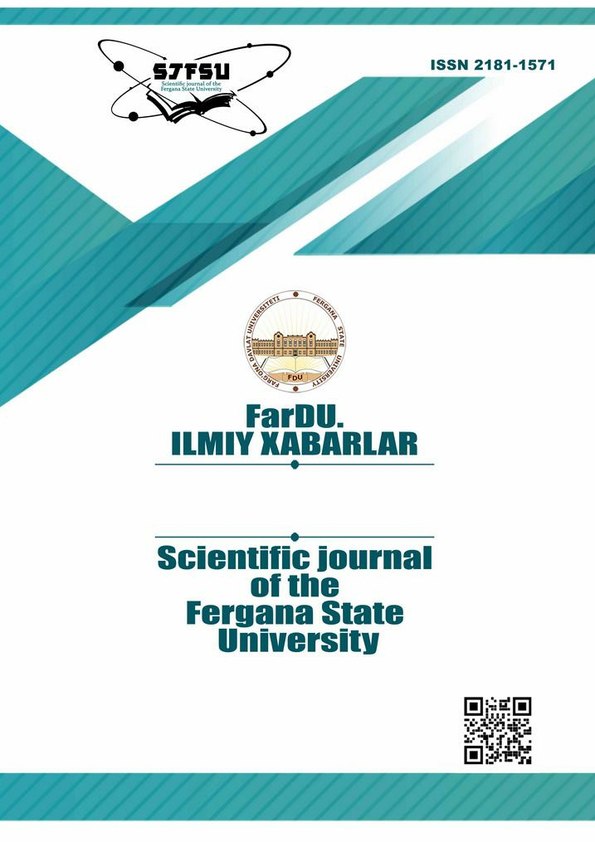THE ACTIONS ON THE CREATION OF THE UZBEK-LATIN ALPHABET
Main Article Content
Abstract
At the beginning of the last century, the devotees of the nation, who appeared on the stage of history under the name of Jadids, dreamed of building a state with a developed economy and science. To do this, it was necessary, first of all, to make the nation literate, to educate young people who have acquired modern knowledge. To this end, they established schools in a new way.
The Arabic script, which had been used as the main script for more than a thousand years, was reformed due to difficulties in reading and teaching. When this reform did not give the expected result, efforts began to move to the Latin script, like other Turkic nations.
After the beginning of the movement for the transition from the Arabic script to the Latin, Uzbek intellectuals published articles on the selection of letters for the existing sounds, their scientific justification, and organized various council meetings and conferences. Should singarmonistic dialects be based on when composing a new alphabet? Or should one be based on corrupt dialects without singarmonism, which cannot reveal the nature of the Uzbek language? This issue was standing on the agenda, and there were a lot of disputes and controversies on this issue. Such controversies also influenced the movement to create a national alphabet, resulting in the creation of four projects by different organizations, as mentioned above. The article compares the projects of this alphabet given on the basis of three sources, and analyzes similar and different aspects in them, their scientific justification in the obtaining of letters, their achievements and disadvantages.
Article Details

This work is licensed under a Creative Commons Attribution-NonCommercial-NoDerivatives 4.0 International License.
References
Қурбонова М. Фитратнинг тилшунослик мероси. Филол. фан. номз. дисс... – Тошкент, 1993. – 120 б. (Kurbanova M. The linguistic heritage of Fitrat. Candidate of philological sciences dissertation. - Tashkent, 1993. – 120 pages)
Сайидов Ё. Фитрат бадиий асарлари лексикаси. Филол. фан. номз. дисс... – Бухоро, 2001. – 204 б. (Sayidov Y. Lexicon of Fitrat literary works. Candidate of philological sciences dissertation. - Bukhara, 2001. – 204 pages)
Сайидов Ё. Жадид бадиий асарлари лексикаси. Филол. фан. док. дисс... – Бухоро, 2013. – 302 б. (Sayidov Y. Lexicon of Jadid literary works. Doctor of philological sciences dissertation. - Bukhara, 2013. – 302 pages)
Йўлдошев М. Чўлпоннинг бадиий тил маҳорати (“Кеча ва кундуз” романи мисолида). Филол. фан. номз. дисс... – Тошкент, 2000. – 120 б. (Yuldashev M. Chulpan's literary language skills (on the example of the novel “Day and night”). Candidate of philological sciences dissertation. - Tashkent, 2000. – 120 pages).
Неъматова Д. Чўлпон публицистик асарларининг лингвистик таҳлили: Филол. фан. ном. … дис. автреф. – Тошкент, 2004. – 24 б. (Ne'matova D. Linguistic analysis of Chulpan's publicist works. Candidate of philological sciences dissertation. Abstract. – Tashkent, 2004. – 24 pages).
Бобомуродова Ш. Ўзбек тилшунослиги ривожида Элбекнинг роли. Филол. фан. номз. дисс... – Тошкент, 2002. – 132 б. (Babomurodova Sh. The role of Elbek in the development of Uzbek linguistics. Candidate of philological sciences dissertation. - Tashkent, 2002. – 132 pages).
Тоғаев Т. Ашурали Зоҳирий ва унинг тилшунослик мероси. Филол. фан. номз. дисс... автореферати. – Тошкент, 2005. – 24 б. (Togaev T. Ashurali Zahiri and his linguistic legacy. Candidate of philological sciences dissertation. Abstract - Tashkent, 2005. – 24 pages).
Бобониёзов А. А.Қодирийнинг “Ўткан кунлар” романида тасвирий воситалар ва тил бадиияти: Филол. фанлари ном. … дисс. автореф. – Тошкент, 1995. – 24 б. (Bobaniyozov A. Imagery and language arts in A.Kadiri’s novel “Days Gone By”. Candidate of philological sciences dissertation. Abstract. - Tashkent, 1995. – 24 pages).
Чориева З. Абдулла Қодирийнинг «Ўткан кунлар» романидаги мактубларнинг луғавий-маъновий ва услубий хусусиятлари: : Филол. фан. ном. … дис. автореф. – Тошкент, 2006. – 23 б. (Chorieva Z. Lexico-spiritual and methodological features of the letters in the novel “Days Gone By” by Abdullah Kadiri: Candidate of philological sciences dissertation. Abstract. – Tashkent, 2006. – 23 pages).
Джалолова Л. Абдулла Қодирийнинг «Ўткан кунлар» романининг лингвистик тадқиқи: Филол. фан. ном. … дис. автореф. – Тошкент, 2007. – 22 б. (Djalolova L. Linguistic study of Abdullah Kadiri’s novel “Days Gone Days”: Candidate of philological sciences dissertation. Abstract. – Tashkent, 2007. – 22 pages).
Нормаматов С. Абдулла Авлоний шеърияти лексикасининг маъновий-услубий хусусиятлари: Филол. фан. ном. … дис. автореф. – Тошкент, 2011. – 25 б. (Normamatov S. Spiritual and methodological features of the lexicon of Abdullah Avlani’s poetry: Candidate of philological sciences dissertation. Abstract. – Tashkent, 2011. – 25 pages).
Жамолхонов Ҳ., Умаров А. Ўзбек ёзувининг XX аср тарихи. I китоб. – Тошкент: Алишер Навоий номидаги Ўзбекистон Миллий кутубхонаси нашриёти, 2017. – 446 б. (Jamolkhanov H., Umarov A. 20th century history of Uzbek writing. Book I. - Tashkent: Publishing house of the National Library of Uzbekistan named after Alisher Navoi, 2017. – 446 pages).
Янгибаева Н. XX асрнинг 20-йилларида ўзбек тилшунослиги жараёни. Филология фанлари номзоди илмий даражасини олиш учун ёзилган дисс... – Қарши, 2019. – Б.127. (Yangibaeva N. The process of Uzbek linguistics in the 1920s. Dissertation written for the degree of candidate of philological sciences. - Karshi, 2019. – 127 pages).
Bagdanova M. Latin asasida tuzilgʻan oʻzbek layihalarining tarixiga bir nazar// Alanga, 1926, №2. (Bagdanova M. A look at the history of Uzbek projects based on Latin// Alanga, 1926, №2.)
Жамолхонов Ҳ., Умаров А. Ўзбек ёзувининг XX аср тарихи. II китоб. – Тошкент: Алишер Навоий номидаги Ўзбекистон Миллий кутубхонаси, 2019. – Б.426 (Jamolkhanov H., Umarov A. 20th century history of Uzbek writing. Book II. - Tashkent: National Library of Uzbekistan named after Alisher Navoi, 2019. - 426 pages).
Oʻzbek yangi alifbasini tuzishda asaslar (Matiriyalardan toʻplab tuzguchi: Abdulla Alaviy). – Samarqand – Tashkent. – 1927 (arab yozuvida). (The basics in the creation of the Uzbek new alphabet (Compiler from materials: Abdulla Alavi). - Samarkand - Tashkent. – 1927 (in Arabic script).

